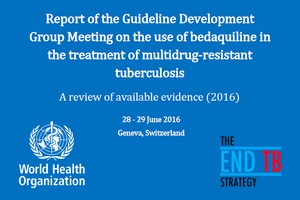WHO maintains existing recommendations for the use of bedaquiline
The conditional recommendation will be maintained until a new systematic review of evidence is warranted or the results of the phase III clinical trial of bedaquiline become available.
Geneva ¦ 13 March 2017 - Three years after the issuance of the interim policy guidance on the use of bedaquiline in the treatment of multidrug-resistant tuberculosis (MDR-TB), the World Health Organization (WHO) convened a Guideline Development Group meeting to assess new evidence and experiences of countries in implementing bedaquiline. Following the evidence assessment made by the Guideline Development Group, the experts advised WHO to prolong the existing conditional recommendation on the use of bedaquiline to strengthen the longer MDR-TB regimens in line with the latest WHO guidelines on the treatment of drug-resistant TB. The conditional recommendation will be maintained until a new systematic review of evidence is warranted or the results of the phase III clinical trial become available.
The decision was based on an extensive evaluation undertaken by the Guideline Development Group, with review of data from 537 patients. The data set included patients enrolled from Armenia, France, Georgia, South Africa, as well as data provided by the drug manufacturer, Janssen Pharmaceuticals, from 11 countries.
“New anti-tuberculosis drugs such as bedaquiline represent a major advance in the management of MDR-TB patients. We have gone from having very limited alternatives to treat MDR- and XDR-TB to having now two new drugs which offer hope to patients. WHO recommendations on their use, given accelerated regulatory approval after phase IIb trials, must be based on well-documented evidence of efficacy and lack of toxicity”, said Dr Mario Raviglione, Director of the WHO Global TB Programme. “WHO looks forward to reviewing results from Phase III trials as soon as available, which could potentially expand use of this drug, saving more lives.”
In line with the existing WHO conditional recommendation on bedaquiline, countries are encouraged to continue using bedaquiline in patients who are not eligible for the shorter MDR-TB regimen and who have: i) confirmed additional resistance to fluoroquinolones (MDR-TB+FQ) or second-line injectable drugs (MDR-TB+SLI); ii) confirmed extensively drug-resistant TB (XDR-TB); iii) known adverse drug reactions, poor tolerance, or contraindication to any component of the combination regimen; or iv) in cases of unavailability or lack of guaranteed supply of a medicine being part of the combination regimen. In practice, this means that virtually all the MDR-TB patients not eligible to receive the shorter MDR-TB regimen may be eligible to receive a regimen that includes bedaquiline.
Although the observational data assessed by the Guideline Development Group were suggestive of a reduction in mortality for patients using bedaquiline in combination with a WHO-recommended longer regimen, specific harms (e.g. adverse events such as cardio-toxicity) were similar to those observed in the original phase IIb randomised control trial. WHO therefore continues to recommend active TB drug-safety monitoring and management (aDSM) of all patients receiving treatment with bedaquiline to identify and manage any adverse event as early as possible. The implementation of aDSM is not only helpful for the systematic monitoring and management of patient safety, but can also help support the scale-up of bedaquiline, delamanid and shorter treatment regimens within countries, and ultimately help policy refinement at local and global levels in the future.
“We need systematic monitoring of all patients receiving the drugs according to established conditions. Regular patient and treatment monitoring facilitate the early identification of at-risk patients and provide an opportunity for clinicians and health services to respond in a timely manner and prevent complications,” said Dr Karin Weyer, Coordinator, Laboratories, Diagnostics & Drug-Resistance, WHO Global TB Programme. “It is therefore essential that the implementation of new drugs goes hand-in-hand with close clinical and laboratory monitoring of patients.”
For more information on the WHO evaluation process on the use of bedaquiline within the wider framework of recommendations for the management of drug-resistant TB, please find below a Frequently Asked Questions (FAQ) sheet, developed by WHO with technical and implementing partners and other stakeholders.


